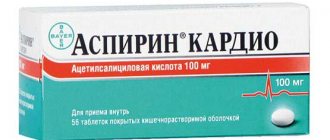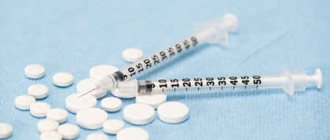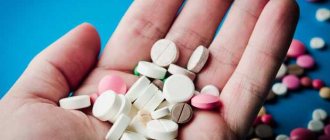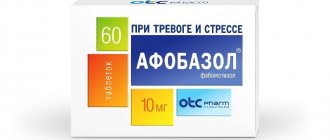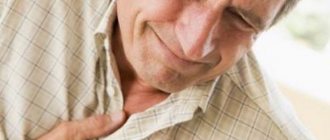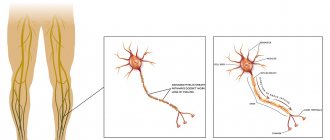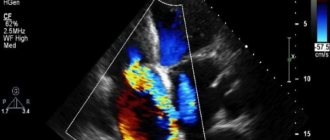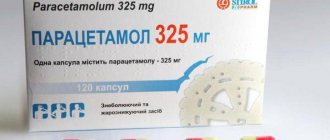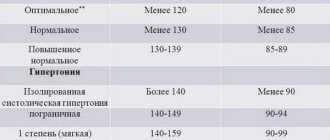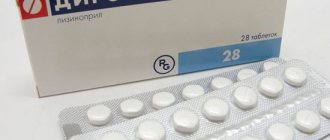Detailed instructions for varicose veins
Considering the features of action described above, it is important to understand that the use of the drug is possible only as prescribed by a specialist with a careful study of the characteristics of his body and taking into account contraindications and compatibility.
When is the drug indicated, and what are its limitations?
Ascorutin can be used in various fields of medicine, in particular, experts recommend it for:
Like all medicines there are restrictions on taking:
- hypersensitivity to components;
- predisposition to thrombosis, thrombophlebitis;
- gout;
- severe renal impairment;
- diabetes (type 2);
- cystinuria;
- treatment with sulfonamides, aminoglycosides;
- hypercalcemia;
- hypokalemia;
- children (up to three years old).
How to use?
The dosage and frequency of taking the drug are determined individually: the treatment regimen depends on the diagnosis, the age of the patient and the presence of concomitant diseases.
The dosage is calculated according to the following rules:
Compatibility
To avoid negative reactions, it is important to consider the compatibility of the drug, especially if therapy involves taking several drugs:
Treatment of children
Ascorutin is useful not only for adults, but also for children (from three years old). Most often the drug is prescribed for:
- nosebleeds;
- for the prevention or treatment of colds.
But it can also be used for:
- insufficient absorption of vitamin C;
- renal inflammatory disorders;
- rheumatism;
- vasculitis;
- colds and infectious diseases.
Dosing for children is as follows:
- To prevent nosebleeds, children over three years of age can take half a tablet twice a day, and adolescents can take a whole tablet up to three times a day. The duration of the preventive course of treatment is a month.
- For colds, take the drug one tablet three times a day. Therapy continues for at least ten days
Ascorutin has a positive effect on the child’s entire body and also performs the following actions:
- promotes the mental and physical development of the child;
- reduces the frequency of colds.
But compared to adults, children are more likely to experience negative reactions. If the baby’s condition worsens during drug therapy, you should stop taking it and consult a doctor.
During periods of breastfeeding and pregnancy
Ascorutin is effective for the prevention and treatment of many infectious pathologies. Therefore, it is often prescribed during pregnancy to prevent the occurrence or treatment of viral infections in combination with other drugs. It helps eliminate runny nose and lacrimation, improves blood and oxygen flow to all organs, and has an antioxidant effect.
In addition, the use of the drug during pregnancy allows:
- strengthen blood vessels;
- prevent the development of varicose veins, hemorrhoids and their exacerbations;
- minimize the risk of fetal hypoxia and bleeding during childbirth.
Ascorutin is prescribed only from the second trimester of pregnancy. The dosage is selected individually, based on the general condition of the woman. While taking the medicine, expectant mothers should be regularly monitored by a doctor.
For hepatitis B, the use of the medication is not recommended. Rutin, which is part of it, does not pass into breast milk. But vitamin C, especially in large doses, can cause allergies in a child. The decision about the need to use the drug is made by the doctor.
Experts' opinions
Experts emphasize that Ascorutin helps strengthen the vascular system. The drug is available, but can sometimes cause side effects:
Karpenko S.A., phlebologist: “Ascorutin is a universal remedy for any vascular disorders. It is effective both in cases of microcirculation disorders and in cases of serious disruptions of venous blood flow in the form of hemorrhoids and CVI. The drug is safe and effective, has a low price, and rarely causes negative consequences. But if it is used incorrectly, allergic manifestations and stool upset are possible.”
Zhdanov A.S., phlebologist: “Ascorutin contains the entire complex of substances necessary for vascular health. It can be used both for dermatological diseases and in the treatment of pathologies of the heart and blood vessels. Negative reactions to the drug are rare. I prescribe the drug in long courses, but it doesn’t work in short courses.”
What do patients think?
The positive effect of using Ascorutin is confirmed by numerous reviews of people who have taken this drug:
Zhanna: “I often had nosebleeds - almost after every wash. I went to the doctor. No pathologies were identified. It turned out that the reason for their appearance is the weakness of the walls of blood vessels. Ascorutin was prescribed. The drug is inexpensive, but most importantly, it is effective: after treatment, the nosebleeds stopped.”
Tatyana: “After the birth of my second child, the veins in the legs and chest became very noticeable, and I was often bothered by dizziness and fatigue. After a while, bruises also appeared. On the recommendation of a neighbor, I started drinking Ascorutin. The result appeared after 2 months: the volume of the veins decreased, general well-being and even the condition of the hair improved.”
Elena: “I took Ascorutin to strengthen blood vessels - the capillaries in my eyes often burst. The problem went away after 2 weeks. Now I periodically take pills for prevention. The price of the drug is reasonable, and it is available in almost every pharmacy.”
Ascorutin: instructions for use for children with nosebleeds and dosage
“Ascorutin” instructions for use for children with nosebleeds deserves attention for its detailed study, because all children get sick. Weakened immunity and cardiovascular diseases are diagnosed in every second child. Modern medicine does not stand still.
The use of new targeted drugs helps the baby get stronger and restore immunity. One such remedy is Ascorutin.
This combined action drug accelerates recovery during seasonal colds, contains vitamins and strengthens blood vessels, which is especially important for nosebleeds.
Indications for use
The drug is recommended from the age of three. The targeted action of “Ascorutin” replenishes vitamin deficiency. The composition of “Ascorutin” includes: vitamin C (ascorbic acid) and vitamin P (rutin).
Rutin, which is part of the composition, helps the rapid absorption of ascorbic acid, preventing its destruction, and ensures the penetration of the drug components into the cells of the human body.
This medicine has a preventive effect on the body, allowing you to effectively fight colds, accelerate the recovery period, and strengthen the immune system. The frequency of nosebleeds is reduced. Reduces vascular permeability and fragility
Clinical trials of the drug have proven its effectiveness during the cold season. Children who took this drug fell ill with the flu three times less often, unlike their peers.
If a child has a sore throat, a fever and a runny nose, then doctors advise taking not vitamin C, but specifically Ascorutin.
"Ascorutin" has additional valuable properties:
- activates the body's resistance to infections;
- helps improve oxygen metabolism;
- reduces intoxication;
- reduces the toxicity of free radicals;
- helps replenish vitamin C;
- stabilizes blood clotting;
- reduces inflammatory processes;
- provides a preventive effect for nosebleeds;
- restores the body after illness.
This medication stabilizes kidney function and reduces protein loss. In the autumn-winter period, “Ascorutin” is advisable to use for the prevention of colds.
Causes of nosebleeds
For nosebleeds, doctors often recommend Ascorutin to children.
Weakness and fragility of blood vessels in a baby may occur due to the following factors:
- Hereditary pathologies.
- Viral and bacterial diseases.
- Various nasal injuries.
- The use of vasoconstrictor medications.
- Hormonal abnormalities.
- Entry of a foreign body into the nasal cavity.
- Dry indoor air during the heating season.
- Presence of anatomical features;
- Neoplasms in the nose.
Frequent nosebleeds are a reason to contact a pediatrician, who will prescribe the necessary treatment. If these unpleasant phenomena persist, additional consultation with an ENT specialist, oncologist, immunologist and endocrinologist will be required.
"Ascorutin" is available in tablets. The package contains 10, 50 and 100 tablets. The drug is taken after meals, with a small amount of water. The duration of treatment is no more than 3 weeks.
For up to three years, the drug can be used only as prescribed by a doctor. Because, at such an early age, taking medications that contain vitamins can contribute to allergic reactions, especially if the dose of the drug is exceeded.
Table 1
Dosage of "Ascurutin" depending on the age group:
| Preventive and therapeutic measures | Age group (years) | Number of tablets | Number of appointments per day |
| Preventive | 3 –12 | 1/2 –1 (per day) | 2 –3 |
| Medicinal | 3 –12 | 1/2 –1 (per day) | 3 |
| Preventive | over 12 | 2 (per day) | 1 |
| Medicinal | over 12 | 2 (per day) | 3 |
| Preventive | adults | 1 (per day) | 1 |
| Medicinal | adults | 3 (per day) | 3 |
Do not leave the drug on the table, in a place accessible to the child. All kids love sweets and they will definitely like the pleasant taste of Ascorutin. And the child will want to eat the delicious “candy” again. Exceeding the recommended dose can lead to severe headaches, nausea, vomiting, impaired renal function, and increased blood pressure.
If the above symptoms occur, you should rinse your stomach with water in which activated carbon is dissolved. Call an ambulance immediately.
Contraindications and side effects
Side effects when taking Ascorutin occur infrequently. As a rule, they occur when the recommended consumption limits are exceeded or as a result of prolonged use.
They manifest themselves with a number of symptoms:
- Dysfunction in the digestive tract.
- Sleep disturbance.
- Allergic manifestations.
- Formation of kidney stones.
Taking the drug is not recommended:
- children under three years old;
- with increased sensitivity to the components of this product;
- with a high platelet count;
- with diabetes mellitus.
This medicine is sold in pharmacies without a prescription. Before starting treatment, you should consult your doctor to receive recommendations on the duration and dosage of the drug.
You should not prescribe treatment for yourself. Uncontrolled use of medications can worsen your health.
Source: https://BolezniKrovi.com/krovotecheniya/askorutin-dlya-detej.html
Use for facial skin defects
Vitamins C and P in the form of the drug Ascorutin are an important component of the complex treatment of facial skin diseases. It helps remove spider veins, reduce the visibility of age spots, and prevent premature aging of the skin.
For pigmentation disorders
In dermatology, Ascorutin is used both externally (in the form of masks) and internally. The tablets are taken according to the standard regimen - two pieces three times a day. The duration of treatment is a month.
Remedies for age spots are prepared in different ways: it all depends on the severity of the problem and skin type. The most effective recipes are presented below (Table 2).
Table 2 - Masks for age spots
| Mask ingredients | Quantity | Preparation | Mask duration | How many times to apply | When else can it be used? | |
| 1. | Sour cream | Tablespoon. | Homogeneous mixture. | 15-20 minutes. | Every other day, apply for a month. | Wrinkles. |
| Ascorutin powder | Tea spoon. | |||||
| Aloe juice | 2 tsp | |||||
| 2. | Pea flour | 14 mg | Grind the tablets, mix with flour, add essential oil, dilute with a small amount of mineral water or chamomile decoction. | 10 minutes. | Three times during the day. | Pimples, blackheads. |
| Askorutin | ||||||
| Orange essential oil | 3-4 drops |
The mixture can be used externally while taking pills or between courses of treatment. Their use should be agreed with a doctor.
For rosacea and rosacea
If such skin disorders develop, you can take tablets or prepare masks. In the first case, take a tablet three times a day. Duration of therapy is up to a month. Treatment must be done every six months. To prevent exacerbation of the symptoms of the disease, you can take the vitamin in a reduced dosage - one tablet per day.
Masks based on Ascorutin also have a good effect: they help relieve inflammation, reduce swelling of the face, and give it a fresh and healthy appearance. They need to be applied to clean skin. It is recommended to do this in the evening, two hours before bedtime. The most effective recipes are presented in the table (Table 3).
Table 3 - Masks with Ascorutin for rosacea and rosacea
| Additional components of the mask with Ascorutin | Quantity of ingredients | Recipe | Mask exposure time | |
| 1. | Melon pulp | They take in equal proportions | Grind 2 tablets of Ascorutin to a powder, mix with the rest of the ingredients. | 2 hours |
| Sour cream or cream | ||||
| 2. | White clay | 2 tbsp. l. | Dilute the clay in milk, add crushed Ascorutin (2 tablets), mix until smooth. | 30 minutes |
| Milk (green tea) | 100 ml | |||
| 3. | Gelatin | 1 tsp. | Mix gelatin diluted in water with the preparation. | 15 minutes |
| Water | 5 tsp. |
Treatment of rosacea and rosacea with Ascorutin should be accompanied by avoidance of:
- cosmetics;
- hot water;
- peelings;
- fatty foods.
Experts confirm the effectiveness of the drug for dermatological problems:
Barieva A.S., therapist: “I often prescribe Ascorutin to patients with rosacea and rosacea in order to strengthen the walls of blood vessels and reduce their fragility. I attribute it to those who experience severe hair loss. One of the most likely consequences of drug therapy is the appearance of local skin reactions. But there have been no complaints about side effects of the drug yet.”
Shcherbak A.V., dermatologist: “Vascular disorders are one of the main causes of dermatological problems. Ascorutin allows you to get rid of such disorders and cope with rosacea, rosacea and even acne. The product is safe, but patients with allergies to vitamin C should use the drug carefully – in small doses.”
Other Applications
The regimen for using Ascorutin may differ depending on the diagnosis and the purpose of its administration.
For hemorrhoids
Ascorutin helps restore the elasticity of vascular walls and reduces the risk of blood clots in inflamed veins. This leads to a reduction in discomfort, pain, itching and burning in the anal area.
It is impossible to cure hemorrhoids with Ascorutin alone: it must be taken together with other medications. The dosage is selected by the doctor based on the form of the disease; most often, taking one tablet of the drug three times a day is indicated.
For vascular health
The medicine is used for the following purposes:
- increasing the tone and elasticity of vascular walls, reducing their permeability;
- therapy of hemorrhagic vasculitis, capillary toxicosis.
For varicose veins of the extremities, Ascorutin is most often used as a prophylactic agent. For medicinal purposes, it is used in combination with other drugs: it helps relieve swelling, inflammation and prevent the formation of blood clots in the affected veins. Reception is carried out according to the standard regimen - a tablet three times a day.
For bleeding
As mentioned above, Ascorutin can be used to relieve nosebleeds in children, gynecological bleeding, as well as hemorrhages in the retina. Ascorutin is not used to stop hemorrhoidal and intestinal bleeding. But it is often prescribed as an auxiliary drug in the treatment of diseases that provoke bleeding.
For diabetes
According to the instructions, Ascorutin cannot be used for this diagnosis. But especially for diabetics, there is a type of drug - Ascorutin D (it does not contain sugar). Therapy with tablets can prevent the development of retinopathy, reduce cholesterol levels, accelerate the utilization of glucose from the blood, and normalize the functions of the pancreas. In this case, two tablets are taken per day, and therapy continues for a month.
In gynecology
In gynecological practice, Ascorutin is prescribed quite often, namely for:
- uterine bleeding;
- heavy and prolonged menstruation;
- cervical erosion;
- to improve the general well-being of women during menopause.
For heavy periods, the drug should be taken in the last three days of the menstrual cycle. After the onset of menstruation, they drink it for another ten days: two tablets up to three times a day.
Ascorutin for men's health
The male body needs the same vitamin complexes as the female body. Vitamin P is especially necessary for a man's health, as it regulates the production of adrenaline, as well as dopamine and norepinephrine. These hormones are responsible for the normal functioning of the male reproductive system, proper muscle formation and physical activity. A man should receive at least 30 mg of vitamin P per day. However, it can only be absorbed in combination with ascorbic acid.
Therefore, for the full functioning of the male body, increasing immunity and fertility, increasing concentration and endurance, and improving heart function, men are often prescribed Ascorutin. The daily preventive dose of the drug for a healthy man is one tablet per day, the therapeutic dosage is three tablets during the day.
During dental procedures
The drug is often prescribed by dentists for the following purposes:
- increasing local immunity;
- strengthening the walls of blood vessels in the oral cavity;
- reducing capillary permeability;
- stimulation of collagen formation (the basis of bone tissue);
- regulation of metabolic processes.
The use of the drug is indicated in the following cases:
- treatment of periodontal disease;
- decreased gum sensitivity with a tendency to bleed;
- prevention of periodontal disease;
- strengthening the blood vessels of the oral cavity after surgical interventions.
It is used according to the standard regimen - one tablet three times a day for a month.
In bodybuilding
The drug, due to its properties, is often used in bodybuilding and other sports. In particular, rutin, which is part of Ascorutin, has the following properties:
- has a powerful antioxidant effect;
- improves blood circulation;
- reduces capillary permeability;
- increases contraction of the heart muscle.
Taking it helps to recover faster after heavy physical exertion and increase endurance. Athletes are recommended to take Ascorutin tablets three times a day.
Ascorutin for children and adults with nosebleeds
If there are frequent nosebleeds, the doctor may prescribe medications to the patient that have a positive effect on the walls of blood vessels.
One of these drugs is Ascorutin, which contains the active component ascorbic acid.
In the process of eliminating nosebleeds with the help of the drug "Ascorutin", the patient should take into account contraindications to it and possible side effects, then the treatment will be quick and effective.
Composition and release form
The drug "Ascorutin" has components such as rutin and ascorbic acid. Available in the form of 50 mg tablets, packaged in a polymer or cardboard jar.
pharmachologic effect
Ascorbic acid, as the main component of Ascorutin, helps reduce the fragility of capillaries and their permeability.
With the help of vitamins C and P, which are ascorbic acid and rutin, they strengthen the vascular walls and relieve swelling and inflammation from them. Moreover, vitamin C is able to weaken the radiation effect on the body and protect it from the negative effects of oxidized active molecules.
Ascorbic acid acts as a powerful defense for the immune system; it restores cellular elements, reduces the impact of external allergens and increases the body's resistance to infections. Rutin in the drug has a strong anti-inflammatory effect, it promotes the secretion of bile and normalizes the functioning of the digestive system.
How does Ascorutin help with nosebleeds?
The drug "Ascorutin" is quite effective for bleeding, including nosebleeds. You need to drink one pill two to three times a day for two weeks.
The need to use Ascorutin when there is bleeding from the nose is due to its ability to strengthen the walls of blood vessels and prevent capillary fragility.
To speed up the treatment process, you should take ascorbic acid and rutin along with medications that increase the elasticity of the vascular walls and reduce their permeability.
Dosage in adults
If you have frequent nosebleeds, you should consult a doctor who, after examination, will prescribe the necessary medications in the appropriate dosage. In most cases, Ascorutin is prescribed to stop nosebleeds. The tablets should be taken after meals with water.
It is important to swallow the medicine completely, and not chew or dissolve it, since when the components of the component are broken down in the oral cavity, vitamin C can negatively affect tooth enamel.
Doctors do not recommend taking tablets with mineral water, as it has the ability to neutralize ascorbic acid.
The dosage for adults is as follows: to treat nosebleeds, take one tablet three times a day; For preventive purposes, take one medicine in the morning and in the evening. The duration of treatment is three to four weeks and depends on the severity of the disease.
If you neglect the treatment regimen prescribed by your doctor, you can provoke an overdose of the drug. Then the patient may experience increased blood pressure, insomnia, diarrhea, headache and vomiting.
For children
The drug is prescribed to children after three years of age.
Ascorutin is approved for use by children who have reached the age of three.
If a child often has nosebleeds, the doctor prescribes ascorbic acid and rutin to strengthen the walls of blood vessels and to increase the body's defenses. Children are more susceptible to side effects when taking the medicine.
They manifest themselves in the form of an allergic rash on the skin, nausea and diarrhea. If such manifestations are observed, the drug is immediately discontinued.
Children are prescribed Ascorutin one pill three times a day. The duration of treatment is ten days. During pregnancy and breastfeeding
For women whose pregnancy is up to 12 weeks, taking Ascorutin is contraindicated. In later stages, the use of the drug is possible both to stop bleeding from the nose and to prevent uterine bleeding and dilation of veins in the legs. During the lactation period, the use of the medication is not contraindicated.
Contraindications
It is not recommended to use Ascorutin for people who often have nosebleeds or have the following pathological changes: diabetes mellitus; renal failure; individual sensitivity to the components of the drug; thrombophlebitis; increased blood clotting; fructose intolerance; urolithiasis.
Interaction with other drugs
In the process of treating nosebleeds, the combined use of acetylsalicylic acid and mineral water is not recommended.
During therapy, you should not use oral contraceptives and consume fresh vegetables, fruits, and juices from them.
The effectiveness of the drug is reduced when Ascorutin is used in combination with sulfonamide drugs, heparin and indirect anticoagulants.
When a B vitamin is used simultaneously with Ascorutin, the effectiveness of the vitamin decreases. If you take tablets containing ascorbic acid and rutin for more than a month, the effect of non-steroidal anti-inflammatory drugs, cardiac glycosides and antihypertensive drugs may increase, resulting in serious negative consequences.
Side effects
When using the drug, sleep disturbance may occur.
As a result of non-compliance with recommended doses or neglect of contraindications to the use of Ascorutin, a patient with nosebleeds may experience the following side effects:
- sleep disorders;
- loss of strength and weakness;
- urticaria, thrombocytosis;
- increased excitability of the central nervous system;
- hypertension;
- diarrhea;
- gagging;
- hypervitaminosis C;
- skin rashes;
- nausea;
- anaphylactic shock;
- heartburn;
- itching;
- fluid retention in the body;
- Quincke's edema.
Analogs
In pharmacy chains you can find the following analogues of the drug “Ascorutin”:
- "Vikasol";
- "Immunovit S";
- "Troxerutin" in the form of a gel;
- "Anavenol";
- "Detralex", produced in the form of a gel.
Source: https://InfoGorlo.ru/glotka/askorutin-pri-nosovyh-krovotecheniyah.html
Possible side effects
In rare cases, while taking Ascorutin, negative reactions described in the table occur (Table 4).
Table 4 - Consequences
| Body system, the functioning of which may be disrupted during treatment with Ascorutin | Consequences of therapy |
| Urinary | Kidney failure. |
| Acidification of urine. | |
| ICD. | |
| Damage to the glomerular apparatus of the kidneys. | |
| Nervous | Headache. |
| Prostration. | |
| Increased activity. | |
| Insomnia. | |
| Digestive | Heartburn. |
| Stomach pain. | |
| Irritation of the gastrointestinal mucosa. | |
| Dyspeptic manifestations. | |
| Cardiovascular | Feeling of warmth, heat in the body. |
| Myocardial dystrophy. | |
| Microangiopathy. | |
| High blood pressure. | |
| Immune | Redness, itching of the skin. |
| Rash. | |
| Eczema. | |
| Hives. | |
| Quincke's edema. | |
| Anaphylactic shock. | |
| Breathing problems. | |
| Hematopoietic | Hemolytic anemia. |
| Thrombocytosis. | |
| Neutrophilic leukocytosis. | |
| Erythrocytopenia. |
There may also be side effects of the drug.
Р N000557/01-310807
Trade name of the drug:
Askorutin
International nonproprietary name:
ascorbic acid + rutoside
Dosage form:
pills
Compound:
1 tablet contains: Active substances:
Ascorbic acid - 0.05 g Rutoside (rutin) -0.05 g
Excipients:
sucrose (sugar), potato starch, calcium stearate, talc.
Description:
tablets of a light greenish-yellow color with minor inclusions of a flat-cylindrical shape with a chamfer and a score.
Pharmacotherapeutic group:
Vitamin
Code ATX:
C05CA51
Pharmacological properties
Ascorbic acid plays an important role in the regulation of redox processes, carbohydrate metabolism, blood clotting, tissue regeneration, and helps increase the body's resistance. Rutin eliminates increased capillary permeability, strengthens the vascular wall, reducing its swelling and inflammation. It has an antiplatelet effect, which helps improve microcirculation.
Indications for use
Prevention of hypo- and avitaminosis of ascorbic acid and rutin. As part of complex therapy for varicose veins with edematous and pain syndromes, superficial thrombophlebitis, trophic disorders and ulcers, chronic venous insufficiency, and hemorrhagic diathesis.
Contraindications
Increased individual sensitivity to the components of the drug.
Carefully
Conditions accompanied by blood hypercoagulation and a tendency to thrombosis.
Directions for use and doses
Orally, 1 tablet 2-3 times a day during or after meals. The course of treatment is 2-3 weeks.
Side effect
Allergic reactions (skin rash), dyspeptic disorders are possible.
Interaction with other drugs.
Ascorbic acid increases the absorption of penicillin antibiotics and iron preparations; reduces the clinical effect of heparin and indirect anticoagulants.
Release form
Pills. 10 tablets in a blister pack made of polyvinyl chloride film and printed varnished aluminum foil. 50 tablets in polymer jars complete with lids. Each jar or 5 blister packs along with instructions for use are placed in a cardboard pack. It is allowed to place blister packs with an equal number of instructions for use in corrugated cardboard boxes. Polymer cans may be placed in corrugated cardboard boxes with each row separated by corrugated gaskets, accompanied by instructions for use in an amount equal to the number of packages.
Storage conditions
In a dry place at a temperature not exceeding 25°C. Keep out of the reach of children.
Best before date
3 years. Do not use after expiration date.
Conditions for dispensing from pharmacies
Over the counter.
The manufacturer accepts claims from buyers:
OJSC "Valenta Pharmaceuticals", 141101, Shchelkovo, Moscow region, st. Factory, 2.
Capillary permeability increases in many diseases. These are infectious and viral diseases: measles, scarlet fever, dysentery, hemorrhagic fever, ARVI, influenza. “Ascorutin” is also indicated for septic endocarditis, hypertension, radiculitis, glomerulonephritis, allergies, hemorrhagic diathesis.
Capillaries are severely affected by varicose veins. Especially at that stage when significant swelling appears, ulcers form or severe venous insufficiency occurs. "Ascorutin" strengthens the walls of affected blood vessels, relieves inflammation and prevents the formation of blood clots.
This drug is not intended for emergency stopping of internal bleeding, but it helps eliminate their root cause - vascular weakness. Therefore, it is effective in the complex treatment of nasal, periodontal, intestinal, and hemorrhoidal bleeding.
If menstruation is too heavy and long, Ascorutin is also needed. But it should be taken only after the conclusion of a gynecologist. When excessive menstrual bleeding is caused by hormonal imbalance, Ascorutin alone is not enough - hormonal medications are required.
There is a disease that is especially unpleasant for women: rosacea. The capillaries expand and appear on the face. The cheeks, nose, sometimes the forehead, and chin are covered with a network of red blood vessels. In this case, “Ascorutin” is taken orally, and the facial skin is treated externally, for example, with a tonic lotion with calendula, which narrows the pores and capillaries.
Ophthalmologists prescribe Ascorutin to people with retinal dystrophy. The drug, by strengthening the capillaries of the eyeball, improves its nutrition, and also helps prevent hemorrhage in the retina, which threatens blindness.
Children can be given Ascorutin from the age of three. Its use is especially recommended when a flu epidemic begins. The drug strengthens the immune system of the child's body. It has been proven that if children take Ascorutin, they get the flu three times less often.
Ascorutin instructions for use for children with nosebleeds
Nosebleeds are an alarming symptom, especially when it comes to a child. To prevent its occurrence, experts recommend using a drug that contains vitamins C and P.
Both components help improve the elasticity and strength of vascular walls.
We suggest you figure out how Ascorutin is prescribed to children with nosebleeds, what dosage is needed for small patients of different ages.
Description of the drug
Ascorutin belongs to the pharmacological group of drugs with a combined effect. The tablets are sweet and sour in taste, light green in color, beveled and scored.
They have a flat-cylindrical shape. Cardboard packaging may contain 10, 50 or 100 tablets. When packaged in PVC or glass bottles - 30 or 50 pieces.
The pharmacological agent is approved for over-the-counter release.
The drug compensates for the deficiency of ascorbic acid and rutin. It is known that vitamins P and C increase resistance to infections, as well as harmful environmental factors. Their combination strengthens connective tissues and promotes cell regeneration. Prescribed for conditions characterized by increased permeability of the vascular wall and capillary fragility.
For your information! Ascorutin often complements the treatment of diseases accompanied by a runny nose. This is especially true if nasal drops or sprays that constrict blood vessels are used in therapy.
Rutin is absorbed in the digestive tract, facilitating the transport of ascorbic acid to the small intestine. It is excreted from the body within a maximum of 24 hours with bile or urine.
Ascorbic acid in the body is converted to dehydroascorbic acid, after which it is distributed throughout the body.
Most goes to the adrenal glands, where the substance is metabolized and then eliminated through the urinary system in the form of oxalate. The remaining part is excreted with bile through the digestive tract.
Composition of the drug
The active components of the drug are ascorbic acid (vitamin C), rutin (vitamin P). One tablet contains 50 milligrams of each substance. Ascorbic acid has an antioxidant effect and activates protein synthesis, which ensures the elasticity of blood vessels.
Rutin is a natural flavonoid, strengthens the immune system, improves blood microcirculation, relieves inflammation and swelling of the nasopharyngeal mucosa, and reduces capillary permeability. In addition, Ascorutin contains calcium salt and stearic acid, food starch, talc, and sucrose.
Instructions for use
Ascorutin is used to prevent nosebleeds, as a means of strengthening blood vessels. It must be taken strictly after meals. This will protect the gastric mucosa from the negative effects of ascorbic acid.
Most childhood diseases are associated with a weak immune system. A lack of vitamins contributes to the development of colds and infectious diseases, which most often make themselves felt in the autumn-winter period.
The use of medications does not always have a beneficial effect on the child’s body, and often only worsens the health situation. Prophylactic agents remain the most acceptable option for strengthening the immune system and preventing illnesses.
Ascorutin will help children get rid of runny nose and sore throat, cleanse the body of toxins, protect against infections and improve the condition of blood vessels.
How is ascorutin useful?
In order not to worry about whether ascorutin can be given to children, it is enough to familiarize yourself with its composition and effect on the child. In terms of effectiveness in fighting colds and infections, it is not inferior to aspirin, but unlike the latter, it does not harm the child’s body.
The effect of ascorbic acid is reduced to the normalization of biochemical reactions. It improves metabolism:
- fats;
- collagen;
- aromatic acids;
- tyrosine, etc.
In addition, ascorbic acid carries out active antioxidant work, rids the body of toxins and reduces the activity of free radicals.
Rutin plays the role of a safe catalyst. Thanks to it, the condition of the vascular system improves, capillary permeability increases, which contributes to the accelerated absorption of nutrients. Rutin also:
- reduces plasma loss through the walls of blood vessels;
- helps reduce blood pressure;
- relieves swelling;
- eliminates trophic disorders and paresthesia;
- stops cramps, reduces pain.
Children taking ascorutin restore their vitamin balance. They are much less susceptible to colds.
What childhood diseases are treated with ascorutin?
Ascorutin is very effective in fighting infections. The poor condition of the vascular system greatly aggravates the course of diseases such as influenza, scarlet fever, tonsillitis and measles. The drug serves to strengthen the walls of blood vessels, eliminates their fragility, and improves permeability. It relieves skin rashes that often accompany infectious diseases.
Source: https://dyhanie-legkih.ru/nos/askorutin-instruktsiya-po-primeneniyu-dlya-detej-pri-nosovom-krovotechenii
Composition of the drug
“Ascorutin” is a combination of two vitamins: C and P, taken equally, 50 mg each. Ascorbic acid is one of the most important vitamins, regulating all metabolic processes and a powerful antioxidant. Vitamin P or rutin (rutoside) is a bioflavonoid that primarily protects capillaries and veins.
"Ascorutin" should be taken after meals, swallowed. If you chew them, ascorbic acid will destroy tooth enamel. You should not take the tablets with mineral water, as it partially neutralizes.
There is "Ascorutina" - "Profilaktin S". It has the same composition, only the proportions are different: there is twice as much vitamin C, and half as much vitamin P. This, as is clear from it, is a preventive drug; for treatment it is rather weak, it contains little routine.
Analogs of vitamin preparation
Ascorutin tablets are produced by many Russian pharmaceutical companies. Medicines with the same composition are not produced abroad. The domestic drugs Ascorutin-UBF and Ascorutin-D are considered complete structural analogues of the active ingredients. The difference between the second remedy is the absence of sucrose.
Ascorutin-D tablets can be taken by patients with diabetes. Many domestic and foreign medicines contain one of the active ingredients - ascorbic acid or rutin. Partial analogues are Rutin, Ascovit, Vitamin C, Venoruton. If you need a substitute, you should consult a doctor, since not all analogues of Ascorutin can be used in childhood.
Tags: Ascorutin, medications, medications for children, medications for pregnant women, medications during pregnancy, medications, medications, drug Ascorutin, use of Ascorutin
- Related Posts
- Who should not be vaccinated?
- Why does my child have red bruises under his eyes?
- How to remove a hematoma under the eye?
« Previous entry
Side effects
Very rarely, due to hypersensitivity to the ingredients of Ascorutin, nausea, pain in the stomach, intestinal spasms, and diarrhea appear. Sometimes allergic reactions, increased blood pressure, and insomnia are possible.
Long-term use of Ascorutin or large dosages are fraught with the formation of stones. In addition, the drug may threaten pregnancy, so it should not be used in the first trimester.
"Ascorutin" is contraindicated in cases of increased blood clotting, thrombophlebitis, kidney and bladder stones, gout, and diabetes mellitus.
Ascorutin is a vitamin preparation that contains ascorbic acid and rutin (vitamins C and P).
Available in tablet form.
Pharmacological action of Ascorutin
Ascorutin is a combination drug that replenishes the lack of vitamins C and P in the body. These components take an active part in redox processes and have an antioxidant effect. Rutin promotes the deposition of vitamin C in tissues. Vitamins help strengthen the vascular wall by activating the formation of intercellular substance and reducing the activity of hyaluronidase. Also, the use of Ascorutin reduces the fragility and permeability of capillaries.
Indications for use of Ascorutin
According to the instructions, Ascorutin is prescribed to patients in the following situations:
- For the prevention and treatment of hypo- and avitaminosis of vitamins C and P, damage to capillaries, which is caused by the use of indirect anticoagulants and salicylates;
- As part of complex therapy of diseases that are accompanied by impaired vascular permeability: retinal hemorrhage, scarlet fever, hemorrhagic diathesis, typhus, capillary toxicosis, septic endocarditis, thrombocytopenic purpura, rheumatism, allergic diseases, glomerulonephritis, measles, radiation sickness, arachnoiditis.
Methods of use of Ascorutin and doses
The instructions for Ascorutin indicate that the drug should be taken orally after meals.
For preventive purposes, a dosage of 1-2 tablets 2-3 times a day is recommended for adolescents and adults. Children aged 3 years and older take half or a whole tablet daily. According to reviews of Ascorutin, the duration of the course is always different and is determined by the doctor on an individual basis.
When using this drug for therapeutic purposes, the duration of use is on average 3-4 weeks. It is also possible to take the course again, but only as prescribed by a doctor.
Ascorutin for children with nosebleeds: dosage and instructions for use
Nosebleeds are an alarming symptom, especially when it comes to a child. To prevent its occurrence, experts recommend using a drug that contains vitamins C and P.
Both components help improve the elasticity and strength of vascular walls.
We suggest you figure out how Ascorutin is prescribed to children with nosebleeds, what dosage is needed for small patients of different ages.
At what age can you take the drug?
The instructions say that the product should be taken by children over three years of age. The dose of the medicine is calculated depending on age. To prevent nosebleeds, children and adolescents from 3 to 12 years old are prescribed half a tablet three times a day.
For older age groups, starting from 12 years old, it is recommended to take a whole tablet 2-3 times a day. The duration of treatment is from two weeks to a month. For babies, synthetic vitamins need to be replaced with foods containing ascorbic acid and rutin.
Important! The dosage and duration of the course are calculated for each child individually. Treatment is prescribed by an otolaryngologist or pediatrician.
Contraindications and side effects
Despite the fact that Ascorutin is a regular vitamin, the drug has contraindications. First of all, this is individual sensitivity to the components that make up it. The drug is prescribed with caution in cases of increased blood viscosity and a tendency to form blood clots.
Ascorutin is not recommended for people with chronic diseases of the urinary system, including urolithiasis and renal failure. The drug is prohibited for patients with impaired potassium-magnesium homeostasis. Diabetics should be careful when choosing a product, giving preference to drugs without sugar.
Taking the drug may be accompanied by symptoms such as:
- nausea;
- dizziness;
- allergic reactions;
- loose stools;
- vomit.
If the side effects are pronounced, it is better to stop taking the drug.
Overdose
Exceeding the therapeutic dose of ascorbic acid can cause an increase in the concentration of oxalic acid in the urine, crystallization of citrates and urates. The consequence is diarrhea or urolithiasis.
Use during pregnancy
Since Ascorutin is contraindicated in children under three years of age, its use in the first trimester of pregnancy or during lactation is prohibited. Once the placenta is fully formed, the effect of the drug on the developing fetus will be negligible. During this period, Ascorutin is prescribed by a specialist for prophylactic purposes to prevent bleeding during childbirth.
How to replace the drug
The following drugs are analogues of Ascorutin:
- Ascorutin D - contains the same amount of active substance, but the sugar in it is replaced with sorbitol;
- Ascorutin UVB and Ascorutin N - the composition does not differ from the main product, and the difference in the name is determined only by the fact that the tablets are produced by different Russian pharmaceutical companies;
- Ascorutin K - contains rutin and vitamin C, but is not a drug. Lozenges with this trade name are sold as a dietary supplement;
- Profilaktin S and Immunovit S are analogues of Ascorutin, produced by a Polish company.
The Polish company Elfa produces another analogue of Ascorutin - Ascorutical Forte, which contains calcium. The drug is prescribed to children from five years of age.
Storage conditions and terms
The medicine does not require special storage conditions. It is enough to place the packaging away from ultraviolet rays, where it will be inaccessible to small children.
Temperature range: from +15 to +25 degrees. You should not put the tablets in the refrigerator. The shelf life of the pharmacological product is three years, starting from the date of release. Taking expired medications is not allowed.
It must be remembered that any drugs, even very harmless ones at first glance, cannot be prescribed independently. A specialist will develop a regimen for the treatment or prevention of nosebleeds in children or adolescents.
Yulia Kalashnik
Source: https://VipLor.ru/preparaty/askorutin-detyam-pri-krovotecheniyah
Drug interactions
According to the instructions for Ascorutin, vitamin C reduces the effectiveness of sulfonamide drugs and aminoglycoside antibiotics. This vitamin also reduces the therapeutic effects of indirect anticoagulants and heparin, promotes better absorption of iron, increases the absorption of penicillin, and increases the side effects of salicylates (the risk of developing crystalluria). The use of oral contraceptives reduces the level of vitamin C in the body, which should be taken into account when treating with this drug.
If you simultaneously take vitamins B1, B2, B12 and small doses of vitamin C, then there is a mutual increase in the influence of all components.
At the same time, Ascorutin is not prescribed together with antihypertensive drugs, cardiac glycosides, non-steroidal anti-inflammatory drugs, if the treatment period should last more than a month. The fact is that this drug enhances the effect of the above-mentioned drugs.
Ascorutin during pregnancy
During pregnancy, Ascorutin is not always prescribed, since doctors have different opinions about this drug. However, the most important thing that needs to be taken into account is the main indications for use, which provide undeniable benefits to the body of the mother and baby, and a number of contraindications.
During pregnancy, a woman’s body loses many beneficial substances, which are transferred to the growing fetus, so a lack of any element can lead to health problems. Vitamin C greatly improves immunity, which is extremely important during this special time in a woman’s life. During periods of epidemics and off-seasons, Ascorutin is often prescribed during pregnancy as a prophylactic agent.
The drug also helps to cope with lacrimation and runny nose, reduces intoxication of the body and saturates the blood with oxygen, which is important for the full development of the baby in utero. Often, pregnant women experience increased fragility of blood vessels and capillaries, which is manifested by bleeding from the nose and gums. Taking this vitamin preparation helps to cope with this problem.
Pregnant women are also characterized by such unpleasant moments as inflammation, swelling, varicose veins and hemorrhoids. The use of Ascorutin in dosages prescribed by a doctor helps reduce the symptoms of these disorders and prevents their occurrence. The drug also reduces the likelihood of severe blood loss during childbirth.
In addition, Ascorutin has an antioxidant effect, which is important for the expectant mother and baby.
However, before taking Ascorutin during pregnancy, it is necessary to take into account that there is a contraindication for this drug in the first trimester. Also, we should not forget that taking food supplements and other vitamins containing vitamin C can provoke hypervitaminosis, which subsequently manifests itself as allergies in the mother and baby.
Pregnant women should know that the following diseases are contraindications to treatment with this drug: diabetes mellitus, urolithiasis and thrombophlebitis. The occurrence of a side effect such as increased blood pressure can aggravate the course of pregnancy if the expectant mother suffers from gestosis or other complications.
In any case, permission to take this drug can only be given by the gynecologist who is seeing the woman.
Storage conditions
Ascorutin should be stored in a dark, dry place at a temperature not exceeding 25 degrees. Shelf life – 4 years from the date of issue.
ov R and S-
In complex therapy of diseases accompanied by impaired vascular permeability, incl. with hemorrhagic diathesis, hemorrhages in the retina -
Prevention and treatment of capillary lesions associated with the use of anticoagulants and salicylates.
Release form
Tablets 50 mg + 50 mg - polymer jar (jar) 50 cardboard pack 1-
Tablets 50 mg + 50 mg - contour strip packaging 10 cardboard pack 5-
Tablets 50 mg + 50 mg - contour strip packaging 10 cardboard pack 1-
Tablets 50 mg + 50 mg - polymer jar (jar) 30 cardboard pack 1-
Pharmacodynamics
Rutin, together with ascorbic acid, is involved in redox processes. Rutin, due to its antioxidant properties, protects ascorbic acid from excessive oxidation, preserving its biological activity. In addition, rutin in combination with ascorbic acid reduces capillary permeability and fragility.
Pharmacokinetics
The drug is well absorbed in the digestive tract, distributed through the bloodstream to all organs and tissues; its metabolic products and excess vitamins are excreted from the body with bile and urine.
Contraindications for use
Hypersensitivity to the components of the drug.
Side effects
Ascorutin is well tolerated; in rare cases, allergic reactions to the components of the drug are possible.
Directions for use and doses
For the purpose of prevention, adults and adolescents should take Ascorutin® 1–2 tablets per day, children over 3 years old – 1/2–1 tablet per day. The course is determined individually.
For therapeutic purposes, adults and adolescents take the drug 1-2 tablets 2-3 times a day, children over 3 years old - 1/2-1 tablet 2-3 times a day. The dosage regimen depends on the nature of the disease and can be increased at the discretion of the doctor. The duration of the course of taking the drug is 3–4 weeks. Repeated courses of taking the drug are carried out as prescribed by a doctor.
Interactions with other drugs
Ascorbic acid reduces the effectiveness of sulfonamide drugs and aminoglycoside antibiotics, reduces the therapeutic effect of heparin and indirect anticoagulants, promotes the absorption of iron, increases the absorption of penicillin, and increases the side effects of salicylates (risk of crystalluria). The use of oral contraceptives reduces the level of vitamin C in the body.
With the simultaneous use of low doses of vitamin C and vitamins B1, B2, B12 and BC, a mutual enhancement of the therapeutic effect is observed.
If it is necessary to use it for more than 4 weeks, the drug should not be prescribed simultaneously with cardiac glycosides, antihypertensive drugs or non-steroidal anti-inflammatory drugs, as it may enhance their effect.
Precautions for use
Before starting treatment, consult your doctor!
It should be used with caution in case of e and kidney diseases. Treatment in large doses is not carried out in patients with a tendency to recurrent urolithiasis. When used in large doses, monitoring of renal function and blood pressure, as well as pancreatic function, is necessary.
Special instructions for use
Simultaneous use of the drug with alkaline drinking (mineral waters) reduces the absorption of vitamin C. Absorption may also be impaired by intestinal dyskinesias, enteritis and achylia.
Ascorbic acid can affect the results of various laboratory tests, for example, when determining blood glucose, bilirubin, transaminase activity, lactate dehydrogenase, etc.
Storage conditions
In a dry place, protected from light, at a temperature not exceeding 25 °C.
Best before date
Ascorutin for children
Most childhood diseases are associated with a weak immune system. A lack of vitamins contributes to the development of colds and infectious diseases, which most often make themselves felt in the autumn-winter period.
The use of medications does not always have a beneficial effect on the child’s body, and often only worsens the health situation. Prophylactic agents remain the most acceptable option for strengthening the immune system and preventing illnesses.
Ascorutin will help children get rid of runny nose and sore throat, cleanse the body of toxins, protect against infections and improve the condition of blood vessels.
How is ascorutin taken?
You can also read: Contraindications for the use of Ascorutin
The drug is available in the form of tablets interspersed with capsules containing syrup, which improves the taste of the drug. Before taking ascorutin, you should understand that vitamins are not analogues of sweets and their overdose can adversely affect the child’s body.
The following dosages are established for the use of the drug:
- When implementing preventive measures, children aged 3–12 years are given half or a whole tablet once a day. If the remedy is part of a treatment complex for any disease, the procedure becomes three times more frequent.
- After reaching 12 years of age, for preventive purposes, a child should take 1–2 tablets per day; during treatment, the same dose is used, but 3 times a day.
Ascorutin is taken orally after meals and washed down with plain water. When taking the medicine, it is not recommended to drink juice or mineral water at the same time. They slow down the absorption of the drug.
The course of treatment with ascorutin lasts about three weeks. This period may be extended by the decision of the attending physician.
Analogue of ascorutin for adults
One of the most effective analogues of ascorutin for adults is Detralex. The drug treats venous insufficiency, acute and chronic hemorrhoids. The product allows you to get rid of cramps and relieve pain in the lower extremities.
It relieves swelling, accelerates the treatment of trophic disorders and varicose ulcers. Since Detralex does not pose a threat to the developing fetus, the drug can be prescribed to women during pregnancy. Its use is not recommended during lactation.
In any case, Detralex should be taken only after consultation with a specialist.
Detralex - ascorutin for adults
Considering the numerous reviews about ascorutin, we can conclude that taking this drug is indeed very effective.
Thanks to it, colds in children are reduced by 2-3 times, and there is also a noticeable effect on improving the health of children experiencing chronic bleeding.
The unsatisfactory effect of the product is associated solely with neglect of the instructions for its use and the lack of prior consultation with a pediatrician.
